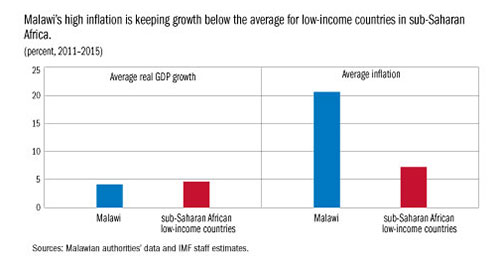
Typical street scene in Santa Ana, El Salvador. (Photo: iStock)
IMF Survey : Malawi: Tackling Inflation Key to Sustainable Growth
January 6, 2016
- High inflation stalling economy
- Donor confidence lags after theft of public funds
- Bold economic reforms help increase reserves
Reducing inflation is the most important policy issue for Malawi in the near term, the IMF said in its recent review of the country’s economy.

Tobacco auction in Lilongwe, Malawi. While a top producer, Malawi’s overreliance on tobacco exports makes it more vulnerable (photo: Michael Runkel/robertharding/Corbis)
ECONOMIC HEALTH CHECK
The report shows currency depreciation and uncertainty about the future direction of policies have kept inflation above 20 percent on average. The economy, heavily dependent on aid flows, is still feeling the effects of the large-scale theft of public funds uncovered in 2013.
The scandal, known as “cashgate,” prompted donors to suspend all budget support, forcing the government to print money to cover the deficit. A poor maize harvest caused by heavy floods and drought in early 2015 has exacerbated the problem by raising food prices and pushing inflation up further.
“If left unaddressed, inflation will become entrenched, continue to hurt investment and growth, and worsen living conditions, especially for the poor,” the study said.
Economic reforms bear fruit
But despite Malawi’s challenges, the report lauded bold economic reforms undertaken in mid-2012 that greatly improved the economy’s resilience. Devaluing the Kwacha, adopting a floating exchange rate regime, the liberalization of the foreign exchange market, and the introduction of an automatic fuel price adjustment mechanism have helped increase the country’s foreign exchange reserves from one month of import cover to over 3 months.
The report also acknowledged significant progress in the social sector such as achieving gender parity in primary school enrollment, improving access to water, and further lowering infant mortality, which has been below the average for sub-Saharan Africa since 2004.
The report noted, however, that high inflation is hampering real GDP growth, which averaged only 4 percent during 2012–15 and significantly below the 7 percent targeted under Malawi’s Growth and Development Strategy.

Fiscal, financial sectors interlinked
Inadequate fiscal adjustment following the “cashgate” scandal affected the financial sector through several channels, the report said. Non-performing loans, for one, increased due to the accumulation of domestic payment arrears to private suppliers who experienced difficulties in servicing loans. Credit risk has since emerged as the most significant threat to the banking sector.
Financing the deficit through increased recourse to domestic financing crowded out bank lending to the private sector, and stubbornly high inflation contributed to higher interest rates and greater exchange rate volatility. These factors, according to the report, have in turn impacted Malawi’s budget and increased the cost of servicing its domestic debt.
The report found that while financial sector depth and inclusion increased steadily through 2012, they have since stagnated in the face of the persistently high inflation and multiple structural obstacles such as limited access to credit, unreliable electricity supply, and high transportation costs. Furthermore, half of the people living in the rural areas do not have access to financial services, as these services are mainly available in urban areas. The report said alleviating these structural barriers would bring substantial benefits to the economy in terms of reducing poverty and attaining sustainable and inclusive growth.
Given Malawi’s dependence on a narrow commodity export base dominated by tobacco and the economy’s exposure to large shocks, the report emphasized the importance of restoring macroeconomic stability in the near term through the pursuit of tighter fiscal and monetary policies geared toward placing inflation on a declining trend.
The report also encouraged the authorities to implement structural reforms to remove supply bottlenecks, increase agricultural productivity, and improve the business environment.


